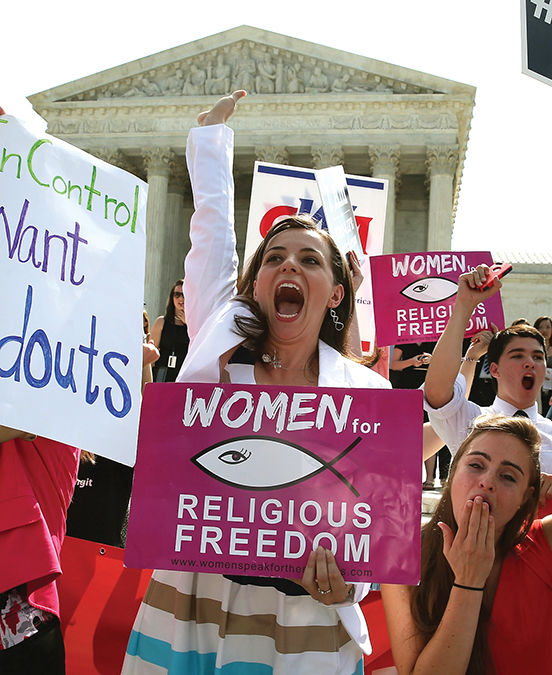The U.S. Supreme Court made a good decision this week in recognizing that Hobby Lobby’s owners can follow their religious beliefs and conscience in running their family business.
The court’s decision in Burwell v. Hobby Lobby Stores, Inc. was narrow and specific to smaller, family-held businesses.
The justices did not resolve the broader issues raised by our government’s demand that most U.S. employers provide birth control, abortion and sterilization coverage in their health care plans.
The government’s mandate has always been about more than birth control and abortion.
In fact, Hobby Lobby has long offered contraception coverage to its employees and it will continue to offer this coverage, although these facts are not being reported in many media outlets.
But the bigger questions raised by the mandate involve the government’s power and the role of religion and faith-based institutions in American life.
Some of these questions are:
— Is religion just something personal that we “do” at home or in churches, temples and mosques? Or is religion a way of living that guides and directs everything we think and do?
— Can the government demand that we abandon our religious convictions as the “price” we must pay for participating in America’s economic and political life?
— Do religious institutions have to give up their religious identity in order to carry out their mission in society?
These are questions that have great implications for America’s future, for our freedom as citizens and believers, and for the Church’s mission in American society. And they are questions that every one of us — as believers and as citizens — need to reflect on.
Our country has always been distinguished by its commitment to religious liberty and freedom of conscience.
This has led to a society that is incredibly diverse and that allows people of many different lifestyles and viewpoints to live together in peace.
The public witness and good works of religious people and religious institutions has shaped our social fabric — in areas ranging from education and health care to charity and the defense of civil rights and social justice.
And American society has always respected the role that religious institutions play in providing vital services in our society — to the poor, the homeless and the immigrant.
There has always been a good partnership between the government and religious institutions. Our ability to cooperate for the common good has always depended on religious institutions having the freedom to be who we are.
But in recent years, we have been finding that the government is trying to pressure religious institutions into offering programs and services that are contrary to their religious mission and moral teachings.
Many Catholic institutions, including charities, hospitals, universities and independent Catholic organizations have challenged the government’s contraception mandate as a violation of their religious liberties.
In the Hobby Lobby case, the Supreme Court did not take up those objections, which are being addressed in separate cases pending in lower courts.
But the court did find that the government’s mandate violates a long-held American tradition that protects individuals from being forced to do things that violate their conscience.
The court noted that we have policies that protect people who do not want to perform abortions or to assist in suicides or participate in capital punishment.
But with the contraceptive mandate, the government is now saying that its programs and policies should take priority over religious convictions, no matter how deeply held.
And this is a dangerous development in our democracy.
Justice Samuel Alito seemed to recognize this in his opinion for the Supreme Court majority. He said that the government’s logic would require companies to pay for assisted suicides and third-trimester abortions in states where these practices are legal.
For now, the Supreme Court has rejected this logic as an intrusion on the fundamental religious liberty of small businesses such as Hobby Lobby.
But as we celebrate our nation’s founding this week, we need to pray for our neighbors and for our nation’s future.
On this 4th of July, we need to thank God for the blessings of liberty. We need to commit ourselves to restoring and renewing American culture and civil society. We need to work for an America that respects the place of religion and protects the fundamental right of all men and women to seek the truth and to live according to their beliefs.
So let us ask our Blessed Mother Mary to help us to bring about a new birth of religious freedom in our land, so that we might live as one family and share the blessings of our freedom with others, working together to build a society of truth and justice.
Archbishop Gomez’s CPA Award-winning book, “Immigration and the Next America,” is available at the Cathedral Gift Shop (www.olacathedralgifts.com/immigrationandthenextamericarenewingthesoulofournation.aspx). Follow him at www.facebook.com/ArchbishopGomez.

